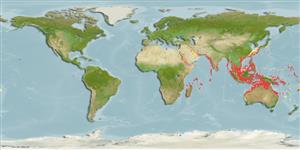>
Ophidiiformes (Cusk eels) >
Ophidiidae (Cusk-eels) > Neobythitinae
Eponymy: Thomas Claverhill Jerdon (1811–1872) was a British physician with both zoological and botanical interests. [...] (Ref. 128868), visit book page.
More on author: Day.
Environment: milieu / climate zone / depth range / distribution range
Ecologie
marien demersaal. Tropical
Indo-West Pacific: Red Sea, Bay of Bengal, Western Australia, Gulf of Thailand, Philippines, East China Sea.
Grootte / Gewicht / Leeftijd
Maturity: Lm ? range ? - ? cm
Max length : 12.5 cm SL mannelijk / geslacht onbekend; (Ref. 5978)
A benthic species found on the continental shelf (Ref. 75154). Oviparous, with oval pelagic eggs floating in a gelatinous mass (Ref. 205). Rarely in markets (Ref. 34024).
Levenscyclus en paargedrag
Maturiteit | Voortplanting | Paaien | Eieren | Fecunditeit | Larven
Nielsen, J.G., D.M. Cohen, D.F. Markle and C.R. Robins, 1999. Ophidiiform fishes of the world (Order Ophidiiformes). An annotated and illustrated catalogue of pearlfishes, cusk-eels, brotulas and other ophidiiform fishes known to date. FAO Fish. Synop. 125(18):178p. Rome: FAO. (Ref. 34024)
Status op de Rode Lijst van het IUCN (Ref. 130435: Version 2024-1)
Gevaar voor de mens
Harmless
Gebruik door de mens
Visserij: van minder commercieel belang
Tools
Speciale rapporten
Download XML
Internetbronnen
Estimates based on models
Preferred temperature (Ref.
123201): 24.3 - 29, mean 27.8 °C (based on 1462 cells).
Fylogenetische diversiteitsindex (Ref.
82804): PD
50 = 0.6250 [Uniqueness, from 0.5 = low to 2.0 = high].
Bayesian length-weight: a=0.00110 (0.00040 - 0.00297), b=3.08 (2.85 - 3.31), in cm total length, based on LWR estimates for this (Sub)family-body shape (Ref.
93245).
Trofisch niveau (Ref.
69278): 3.4 ±0.6 se; based on size and trophs of closest relatives
Weerstandsvermogen (Ref.
120179): Hoog, minimale populatieverdubbelingstijd minder dan 15 maanden (Preliminary K or Fecundity.).
Fishing Vulnerability (Ref.
59153): Low vulnerability (10 of 100).
